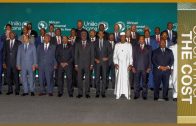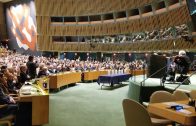Can Africa become the next European Union? | Counting the Cost
A new economic bloc was born when 24 nations came together in May to form the Africa Continental Free Trade Area (AfCFTA). The aim of the bloc was to increase trade between nations by tearing down trade barriers.
Africa’s decision to create an economic bloc could make it the next European Union. Trade between nations on the continent is estimated to be about 20 percent. That compares to 69 percent in the European Union.
If all 54 nations join, the combined spending and investment power is estimated to be $4 trillion, making it a huge market for businesses to tap into with a population of 1.2 billion.
Absent from the original group was the region’s biggest economy, Nigeria, one of the last countries to sign on to the free trade agreement.
For the past two months, Nigeria’s borders have been closed to imports. The government says it is needed to stop illegal goods from being smuggled in and criminals moving freely. Officials also argue products are being diverted to neighbouring countries to avoid paying duties at Nigeria’s four ports.
But the move has led to people in Nigeria paying more for food, especially rice.
Peter Attard Montalto, head of capital markets research at South Africa-based Intellidex, tells Al Jazeera that it is a “long road” until the real potential from the Africa Continental Free Trade Area can be fully realised.
“There’s been so much written and spoken about the upside from the agreement, the connecting together of various different value chains and supply hubs around the continent. But really mapping a path from where we are here to the operation of this thing is going to be incredibly hard,” Montalto explains.
“The full continental agreement is going to take quite a long time to see in any meaningful sense.”
How will Qatar sustain its economy after the 2022 World Cup?
Despite a blockade and a slowing economy, Qatar continues to embark on infrastructure projects that will sustain the economy after the 2022 FIFA World Cup.
Qatar’s Hamad International Airport can handle 35 million passengers, but with a new expansion plan that number could grow to more than 50 million.
Al Jazeera correspondent Hashem Ahelbarra met with the CEO of Qatar Airways and the secretary-general of Qatar National Tourism Council, Akbar al-Baker, about Hamad International Airport’s expansion as its rival Dubai puts its project on hold.
“At Hamad the growth is back to pre-blockade times. We are investing, we are already, as a matter of fact, above the capacity of the airport. We will be closing over 40 million passengers by the end of this year and the capacity of the airport is only 35 million,’ Akbar al-Baker told Al Jazeera.
“After 2022, the FIFA World Cup is over, we will then expand the capacity to just under 70 million passengers by completing the concourse on the west apron next to the runway. So what this will do is it will give us enough room to keep on growing and delivering the plans we have and the strategy Qatar Airways has for up to 2030.”
Can Qatar build on the success of its homegrown giants?
Qatar has paid a huge price for not buckling to demands from its neighbours to shut down Al Jazeera, but hopes to build on the success of the network and of beIN Sports, which earned the right to broadcast the English Premier League in the MENA region.
The country plans to invest in a larger hub for media called Qatar Media City which would compete with well-established hubs in the United Arab Emirates and aim to attract more media companies to set up shop in the country.
Saif bin Ahmed Al-Thani, chairman of Qatar Media City, told Al Jazeera that Qatar’s new media hub would be part of the Qatar Media Corporation ecosystem, and installed with the latest technology. The city would bring together a network of not just journalists but other thinkers, academics and social influencers.
“Look at Qatar Media City as a platform. You cannot compare it to Dubai where it is a real estate project where I provide you a space, you bring your equipment, and you broadcast,” he said.
“To me, it is different. To me, Qatar Media City is a step up from all of these media cities … We are creating a community.”
– Subscribe to our channel: http://aje.io/AJSubscribe
– Follow us on Twitter: https://twitter.com/AJEnglish
– Find us on Facebook: https://www.facebook.com/aljazeera
– Check our website: https://www.aljazeera.com/























